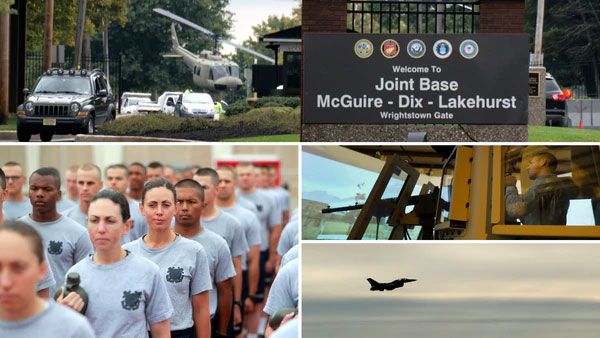New Jersey is home to five military bases, from Joint Base McGuire-Dix-Lakehurst to Picatinny Arsenal, from Naval Weapons Station Earle to the Coast Guard Training Center in Cape May and the 177th Fighter Wing in Atlantic City. These installations are essential to our national security – and our location has made them critical pieces of our nation’s military preparedness.
But, even beyond their importance to national security, our bases are also critical to our state’s economy. Together, our bases employ 70,000 residents both directly and indirectly. Our communities are made stronger by our military families, and local economies are made stronger by them, too.
It is impossible to overlook the importance of these installations to our preparedness, but we cannot overlook the role our military bases and servicemembers play in contributing to our economy. Our servicemembers are our family and neighbors. They contribute as much to our state as they contribute to our nation. The military is New Jersey’s second largest employer and brings more than $6 billion in economic benefit to our state – $3.8 billion in direct economic impacts and an additional $2.7 billion in indirect economic impacts.
We recently led a day-long series of visits to New Jersey’s military bases for New Jersey’s congressional delegation and state officials. We started the day at Joint Base McGuire-Dix-Lakehurst – a sprawling installation that spans two counties and eight municipalities – where we met with New Jersey Army National Guard leadership under the command of the Adjutant General, Brigadier General Jemal Beale, as well as the base commander, Air Force Colonel Neil R. Richardson. The tour continued with visits to the 177th Fighter Wing in Atlantic City, Picatinny Arsenal in Morris County, and Monmouth County’s Naval Weapons Station Earle.
This was more than just an opportunity to thank our troops for their selfless service and sacrifice. It was also an opportunity to learn from military and civilian officials about the varied needs of our servicemembers, their families, and our military installations. And, it gave us a greater understanding of the need to work together to secure the futures of these installations.
New Jersey has long played a vital role in our national security. Our five military bases – more than Connecticut or Pennsylvania – speak to our strategic location. Tens of thousands of servicemembers and civilians currently call the Joint Base home and the KC-46 fleet that is coming to the base will bring new jobs and growth to our state. Plus, the KC-46 refueling tankers will strengthen the Joint Base’s role as an indispensable starting point for national security missions on the East Coast. Additionally, countless Coast Guardsmen have received their training off the coast of Cape May and the Airmen at the Air National Guard’s 117th Fighter Wing conduct critical homeland defense missions with their F-16 fleet. And, many of the technological innovations and strategic weaponry that have changed the very nature of military action have been made at Picatinny Arsenal and Naval Weapons Station Earle.
We must continue to invest in our military installations to prevent reductions in size and closures by actively pursuing growth strategies that will retain and enhance missions already in the state while creating an environment that acknowledges the importance of our bases as economic drivers.
Like so many fields in the innovation economy – from direct technological research and development to advanced logistics, among others – our military installations are primed for growth. Additionally, many of our New Jersey academic institutions – including the New Jersey Institute of Technology, Princeton University, Rowan University and Rutgers University – are receiving federal defense grants for cutting-edge research projects to enhance our national security. We have a lot to lose if we don’t recognize and promote both the strategic and economic value of military projects in our state.
And we simply can’t afford to allow New Jersey’s installations to weaken or become decommissioned. We already saw the upheaval to the local economy caused by the 2011 closure of Fort Monmouth. Avoiding a repeat means identifying opportunities to increase the investment in our military installations. At the same time, we’ll be looking out for our servicemembers and their families by improving base family housing, working to prevent exposure to potentially cancer-related contaminants in the water, providing opportunities for military spouse employment and advancing critical infrastructure projects.
In Congress today, New Jersey’s delegation is well-positioned to vocally fight for this. We have two new members on the House Armed Services Committee – Representatives Andy Kim and Mikie Sherrill – and our colleagues have secured key roles advocating for economic and national security, including seats on the Appropriations, Energy and Commerce, Foreign Affairs, Homeland Security, and Transportation Committees.
We always thank our women and men in uniform and the civilians that work alongside them for their service in defending our freedom and security. But, we also must thank them for keeping our communities strong and vibrant. And, working together with our military partners, we intend to keep them as a vital part of our communities, too.
Phil Murphy is the governor of New Jersey. Congressman Donald Norcross is a senior member of the House Armed Services Committee and Chairman of the Tactical Air and Land Forces Subcommittee.
